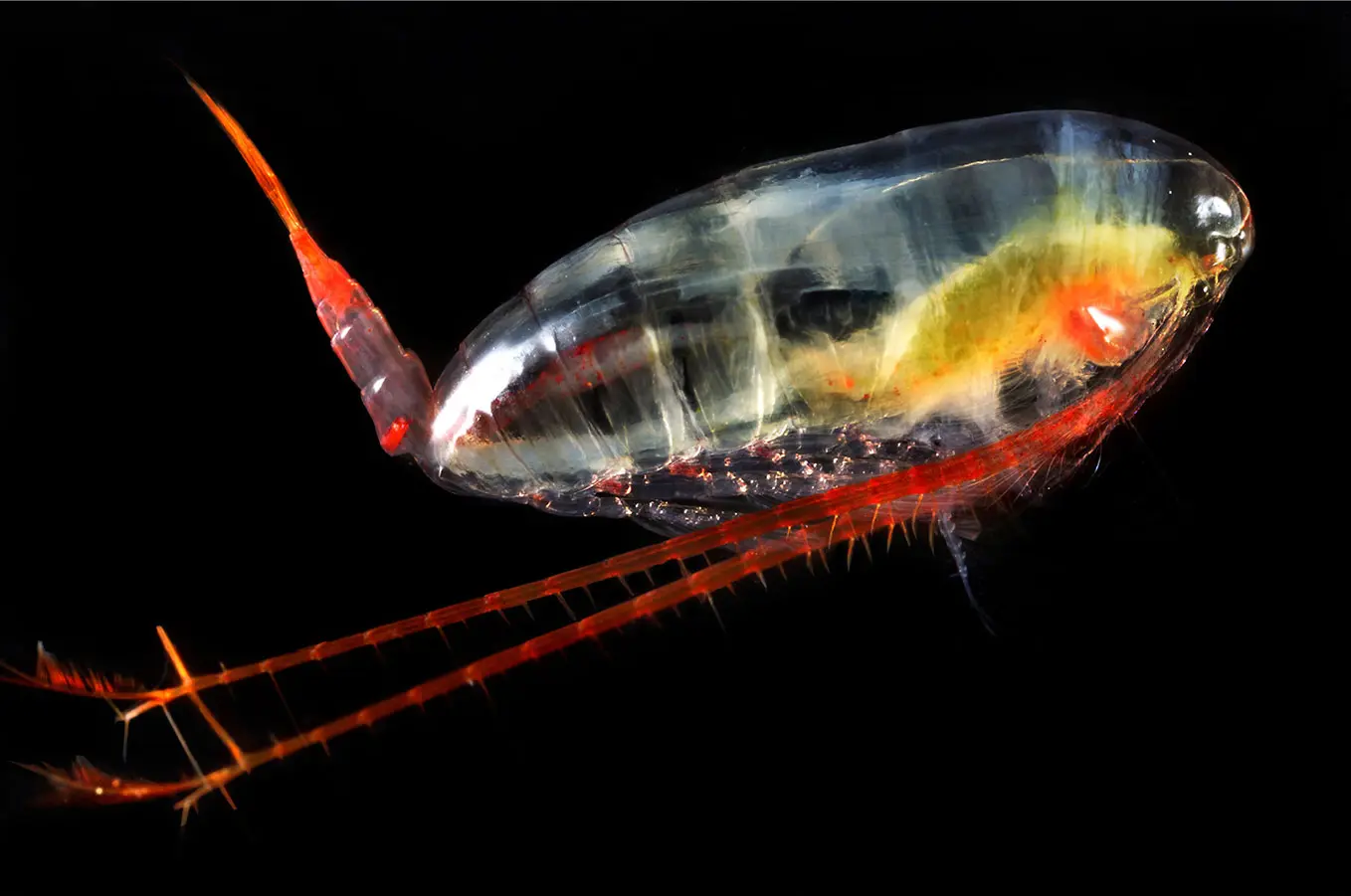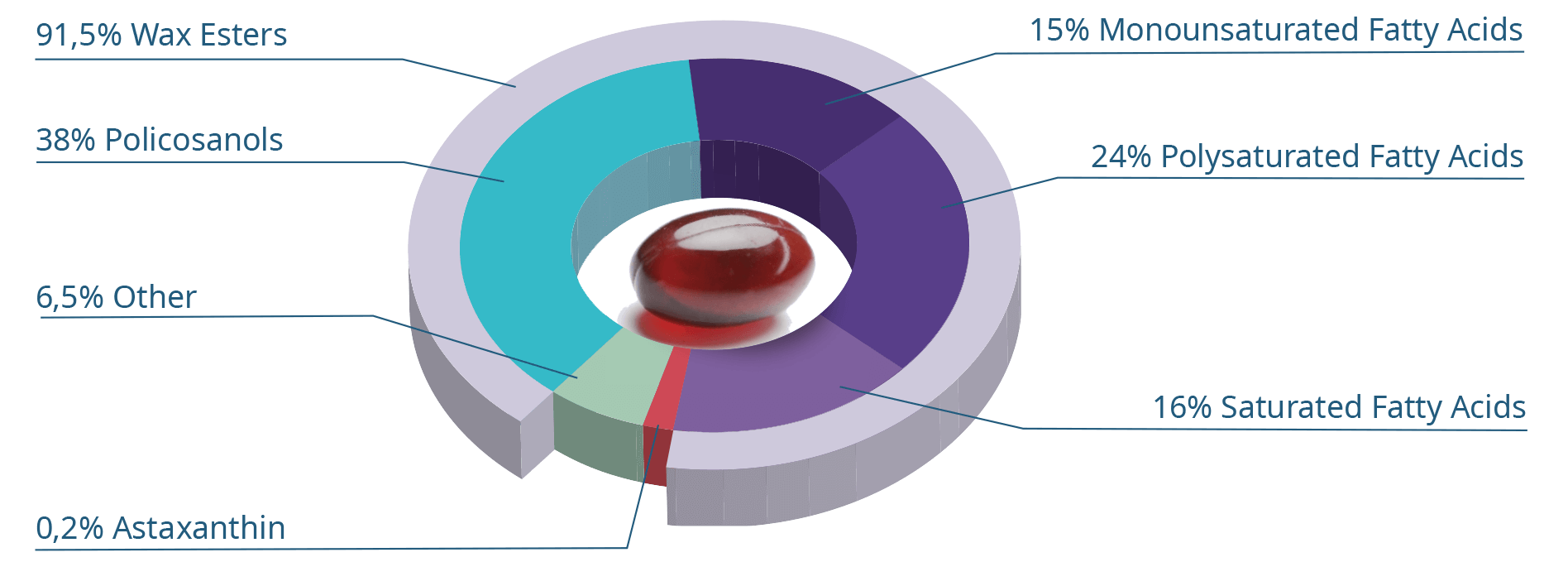Calanus oil,
a new generation of marine omega-3s for health
Seanova, in partnership with ZOOCA®, offers Calanus finmarchicus oil, a zooplankton harvested from the cold, crystalline waters of the North Atlantic. This unique marine resource is distinguished by its specific omega-3 composition in the form of wax esters, combined with a rich and balanced nutrient profile.
This oil is obtained through sustainable fishing practices that respect marine ecosystems.
Calanus, a sustainable, essential and precious resource

Calanus finmarchicus is one of the most abundant species of zooplankton in the North Atlantic Ocean, particularly off the Norwegian coast. This herbivorous copepod, measuring 3 to 5 mm in length, is distinguished by its exclusive diet of marine phytoplankton.
Thanks to its short lifespan, limited to around one year, it has no time to accumulate significant levels of environmental pollutants. This characteristic makes it an exceptionally pure and safe source for nutritional applications.
Calanus finmarchicus is a sustainable resource essential to the functioning of marine ecosystems, serving as food for a multitude of marine species, and is one of the first links in the food chain. Fishing for this zooplankton is strictly regulated to guarantee the sustainability of stocks and protect marine ecosystems. Fishing quotas are deliberately low.
Calanus finmarchicus oil has a unique composition, different from fish oil or krill oil. Its exceptional lipid profile makes it a valuable raw material, particularly suited to the nutraceuticals sector, due to its positive effects on metabolism, joint health, and cardiovascular function.
Calanus oil, the only source of omega 3 in the form of wax esters!
These marine copepods are capable of generating large lipid reserves, mainly in the form of wax esters, which can be extracted.
Extraction is carried out naturally, using only a water bath and enzymes, with no solvents or chemicals used.
The oil extracted from this source is unique thanks to its high omega-3 content, not in the form of triglycerides or phospholipids, but in the form of wax esters.
This specific form enables a gradual release and optimized absorption of omega-3 fatty acids (EPA and DHA), supporting improved bioavailability and metabolic benefits. Wax esters are absorbed more slowly than conventional omega-3s, enabling them to reach the distal intestine. This slower absorption is advantageous, as it activates specific receptors, notably the GPR120/FFA4 receptor. This receptor plays a key role in regulating sugar and lipid metabolism. It is particularly abundant in the distal intestine and requires omega 3 to be activated, helping to improve overall metabolic balance.
Calanus oil, more than just a source of Omega 3
Calanus finmarchicus oil is also distinguished by its high content of marine polycosanols, long-chain fatty alcohols derived from marine wax esters. Rich in omega-9 fatty acids, astaxanthin and SDA (stearidonic acid):

Calanus finmarchicus oil is rich in astaxanthin due to its diet based on marine phytoplankton, particularly species rich in this natural carotenoid, accumulating in its own lipid system.
Astaxanthin is a red-orange pigment produced by certain microalgae and other marine organisms, often in response to stressful environmental conditions such as strong light or nutrient deficiency.
Astaxanthin plays a key role in the health and survival of Calanus, supporting its metabolic functions, enhancing its resilience in cold waters and protecting its cells from oxidative damage caused by UV radiation.
Calanus finmarchicus oil has been approved as a Novel Food for use in dietary supplements, making it an innovative natural resource in this field.
Some benefits of
Calanus finmarchicus oil:
Metabolic health and weight management
Several studies suggest that Calanus finmarchicus oil may help improve insulin sensitivity and reduce insulin resistance, which may be beneficial for the prevention of type 2 diabetes. It may also aid weight management by increasing energy expenditure and influencing lipid metabolism.
Cardiovascular health
Calanus finmarchicus oil helps reduce blood triglycerides and modulate LDL and HDL cholesterol. Its anti-inflammatory and antioxidant effects may help prevent cardiovascular disease.
Anti-inflammatory properties
Calanus finmarchicus oil is particularly rich in astaxanthin, a powerful antioxidant that protects cells against oxidative stress and reduces chronic inflammation, implicated in several degenerative diseases. It is also being studied for its benefits in inflammatory pathologies such as arthritis.
Gut health and microbiota balance
Calanus finmarchicus oil, thanks to its wax esters, reaches the distal intestine more easily, where it undergoes delayed absorption, favoring a prolonged release of omega-3s. This gradual digestion could influence the intestinal microbiota and have a beneficial prebiotic effect.
Explore our Calanus finmarchicus ZOOCA® oil
This marine zooplankton, rich in omega-3 fatty acids, boasts an exceptional concentration of astaxanthin, a powerful antioxidant that gives it its characteristic red color.
This oil is available in various formats: in bulk (drums) for liquid formulations, or in convenient capsule form, with the option of adding vitamin D3.
